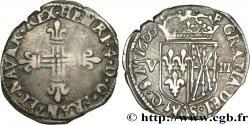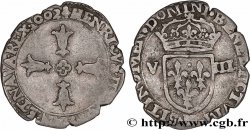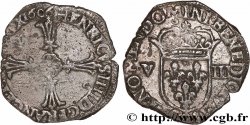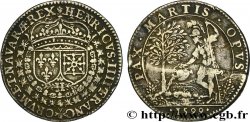正面
正面的文字 HENRI IV - 1589-1610.
正面的说明书 Buste habillé de face.
背面
背面的文字 ANÉPIGRAPHE.
背面的说明书 Blasons accolés couronnés, entouré du collier du Saint Esprit.
评论
历史细节
HENRY IV
(02/08/1589-14/05/1610)
King after the tragic death of Henri III, Henri de Bourbon, King of Navarre, descended from the last son of Saint Louis, Robert de Clermont. With him begins the dynasty of Bourbon which reigned over France until the Revolution, died out in direct line in France with the count of Chambord and still exists, in France, in its younger branch of Orleans and, outside France , in its senior branch, with the houses of Spain, Parma and Sicily. By the declaration of August 4, 1589, Henry IV promised the maintenance of the Catholic religion and the meeting of a national council. It was time for civil war. The Duke of Mayenne had Cardinal de Bourbon, then a prisoner of Henri IV, proclaimed king under the name of Charles X.. The king marched on Normandy and defeated Mayenne near the Château d'Arques (September 21, 1589), but could not take Paris. A loyalist Parliament, chaired by Achille de Harlay, was installed in Tours. After having reconquered all of Normandy, except Rouen, Henri laid siege to Dreux (February 1590). With the reinforcements of the Duke of Parma, Mayenne went against him and met him at Ivry (March 1590). Once again, the leaguers were defeated. The blockade of Paris, defended by the Duke of Mercœur, began in May 1590. Mayenne and the Duke of Parma having appeared at the end of the summer, Henri surrounded the city with a network of loyal towns and bided his time. By the Edict of Mantes (July 1591), he restored the regime of the Edict of Poitiers. On the death of Charles X (1590), the Spaniards put forward the rights of the Infanta Claire-Isabelle-Eugénie, daughter of Philippe II and Elisabeth of Valois. A Spanish garrison settled in Paris. The Duke of Savoy entered Provence, the Spaniards into Languedoc. In December 1592, Mayenne summoned the States General to Paris. They opened in January 1593 and presented several demands: a Catholic king, periodicity of the States, restoration of provincial freedoms, reception of the Council of Trent in France, but refused the candidacy of the Infanta. A general truce was signed in July 1593; the same month, in Saint-Denis, Henri IV abjured Protestantism. The League soon disintegrated and the king was crowned at Chartres in February 1594. He entered Paris the following March. There was no form of repression. Picardy and the Duke of Guise submitted in turn, and Clement VIII gave his absolution to Henry in September 1596. The war against Spain officially began in January 1595. Defeated at Fontaine-Française (June 1595), the Spaniards had to evacuate Burgundy and were pursued as far as Franche-Comté. Mayenne submitted in October, Joyeuse and Épernon followed. In Brittany, Mercœur continued a partisan war until 1598. The operations against the Spaniards were hardly favorable to the French in 1596 and 1597. The peace treaty was signed by the two exhausted monarchies in May 1598: this treaty of Vervins returned to the clauses of the treaty of Cateau-Cambrésis. By the Edict of Nantes (April 1598), declared perpetual and irrevocable, freedom of conscience was granted everywhere to Protestants; freedom of worship remained where it existed and was established at the Court. Half-party "edict chambers" were set up to settle disputes between Catholics and Protestants. The party received a hundred places of safety, including Montpellier, Montauban and La Rochelle. Peace returned, the situation of the kingdom was no less disastrous. Henri IV showed the greatest qualities of a statesman: forgetting the past, he surrounded himself with ardent Catholics, like Villeroy and President Jeannin, at the same time as fervent Huguenots like Sully, Superintendent of Finances in 1601. Skillfully, he gradually reduced the power of governors and parliaments. In 1600 he married Marie de Medici, who gave him a dauphin in 1601. In 1602, he had Marshal Biron, governor of Burgundy, executed for conspiring to raise the Catholics. In 1606, he marched against Sedan, capital of the Duke of Bouillon, who had fled the kingdom, and obtained his submission. Hostility persisted between France and the Habsburgs. In 1601, by the Treaty of Lyon, the Duke of Savoy ceded Bresse, Bugey, Pays de Gex and Valromey to the King of France.. In Italy, however, French influence remained nil.. France supported the United Provinces secretly. On the side of the Empire, Henri was going to intervene in the succession of Cleves and Juliers when he was assassinated by Ravaillac, on May 14, 1610.








 对产品描述纠错
对产品描述纠错 打印
打印 分享我的选择
分享我的选择 提问
提问 Consign / sell
Consign / sell
 产品介绍
产品介绍










